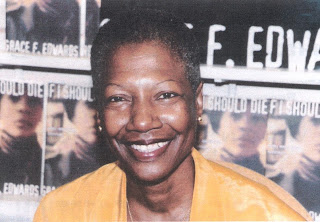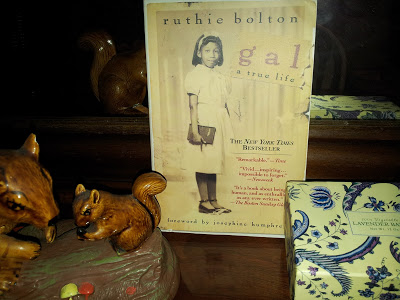First, I apologize if I spoiled anything above and further along. The posted passage comes from Gloria Naylor's novel Linden Hills. Mark it on your summer reading list if you have not read it by now. It is very much worthy of your attention.
I suppose I should first summarize the novel before I get into why I chose to post this passage out of the many meaningful and profound ones found in the novel. Those familiar with the author, Gloria Naylor, are most likely familiar with her The Women of Brewster Place book. Some time in the late 80s that novel adapted into a television miniseries starring Oprah Winfrey. It was a story that orbited a set of women living inside a ghetto, or wall-off community. Throughout each woman's story, we chronicle her life, victories, and misfortunes faced within the desolation of the community. So contrast to Brewster Place is Linden Hills where people enjoy a posh living environment. They are the people with the six-figure income and profligate lifestyles. They are of an affluent pedigree, driven by their desire to remain within the confines of a neighborhood as up-market as Linden Hills. The novel highlights the hidden truths within some of the residents of the community, revealing that what glitters is not gold. Many of these affluent characters are under the bend of Luther Nedeed, whose ancestors settled on the land first, subsequently owning and controlling its properties through his family's realty corporation. His charisma is undeniable in conjunction to his power, so he has influence over the community, much too many of the residents' vexation.
The rest I will leave to those who decide to read the novel because there is so much to explore. Some even wrote essays regarding how Linden Hills parallels to Dante's Inferno. Familiar, but having never read it, I am now interested in Dante's Inferno because of Linden Hills. Backwards? Maybe. Depends on what you like.
The passage I posted recounts a successful, well-established character in the novel who found herself depressed and vacated (except for her visiting Grandmother) inside her 12-room Tudor-style home somewhere in the curves of Linden Hills. The character's name was Laurel, and she made most of her fortune holding down an IBM division that consisted mostly of men. However, she also married into prosperity, which led to her relocating into her husband's (an African-American D.A. of the county) family home in Linden Hills.
Naylor did a fantastic job of laying down Laurel's history on how she spent summers with her grandmother in Georgia. It is here that Laurel would swim in ponds and pirouette to classical music while driven by her muse. Her mother had long since been deceased, and Laurel believed that neither her father nor her step-mother cared too much for her company. She grew up, and it was that same grandmother that she spent summers with who cashed in on her life savings to put Laurel through college. This paved Laurel’s road to success, and as mentioned, Laurel took a different route other than furthering her love of swimming and music. Nevertheless, great career, great marriage, wealth, great home, and a committed husband; one would think Laurel knew she had it, but some things are never enough.
Leading to her suicide we--the readers--come to realize that Laurel is very much unhappy for several reasons. One of those reasons is that she does not feel fulfilled in her marriage. This reality comes to her in the form of disenchantment that her husband--as a male--is far more recognized than herself in the Linden Hills community. She is humbly seen as his wife to her neighbors. As talented and successful as Laurel is her need for self-validation suddenly acquires a snag. It is her grandmother who sits up with her for days watching her granddaughter strum classical music out of her piano within her deperession. Seeing that it is a form of unreached therapy and self-validation for her granddaughter, the grandmother suggest Laurel find what she is seeking in blues music by the likes of Bessie Smith and Billie Holliday. An appalled Laurel finds those artist too low class for her taste. Nonetheless, her grandmother maintains that those artists best speak of the troubles Laurel faces within herself.
There seems to be no chance for Laurel as her husband leaves her and friends stop calling. Then one day Laurel is asked out of her lonely bed by her grandmother, who informs that she has a visitor at the house. Here enters Luther Nedeed who in one conversation tells Laurel that since her husband no longer lives in the house, she would have to move out of the upscale community of Linden Hills. An argument rises and legal threats collide. However, the powerful Luther's visit turns the final twist of the knife in Laurel. With her home falling from beneath her, she feels as if nothing in this world is hers anymore. Unable to listen to her grandmother's methods of curing her blues by standing through it till it moves, Laurel takes her life by diving into an empty swimming pool. Luther Nedeed stood along the corner of the house and watched her take that mortal dive.
Powerful stuff, right? Of course my summarizing this portion of the novel does not give the material justice. Still, the passage and the supporting summary reiterations that success does not necessarily bring happiness to an individual, something we all heard over and over again. However, the one thing we have to ask ourselves is what is the definition of success, especially for the everyday individual who is out to achieve something to better his or her life? See, even I can many times take for granted the things that I have, complaining for more when there are people who would give up so much more to have what I have. I’m fortunate to even be able to read and type this, physically and mentally. So there are successes in my life, but like many, I do not always see success in the small details of living because I am too preoccupied with obtaining my definition of it. So despite that glaring revelation, my complaints for more sometimes gather dark contemplations. Let me spell out that I most certainly do not feel suicidal on such days; Jesus, I would never have the guts. However, I do wonder what life would be like should I not have to participate in every bit of it?
"...struggling to order their existence…"
Because of some unfortunate imbalances and torturous individual philosophies of the human experience, can we not ever learn to consider life itself a success? Or is that not enough? Is that too impossible a concept? Is it safe to say that one’s culture is responsible for this? What is it about trying to make order of life, love, family, health, wealthy, spirituality, and success that should we not obtain this “order” we began to see the uselessness of it all without acknowledging the smaller, fine details?
Naylor, Gloria. Linden Hills. New York, N.Y., U.S.A.: Penguin, 1986. Print.








